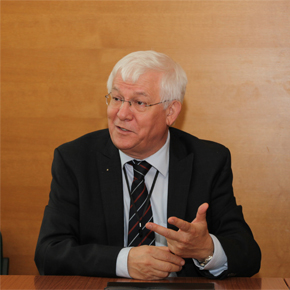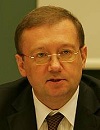Nuclear talks between Iran and six world powers ended on an upbeat note Wednesday, with top Western and Iranian negotiators announcing a follow-up round early next month while speaking of significant progress in efforts to reduce fears that Tehran may be seeking atomic arms.
Despite abandoning the pessimistic tone of previous meetings, however, negotiators refused to reveal details on what - if any - concessions Iran offered. That gives potential traction to skeptics who can claim the conference was aimed more at building trust and silencing critics at home than in resolving the thorny issues that have blocked progress over a decade of talks.
Iran denies suspicions that it wants nuclear arms and has resisted incentives and tough penalties aimed at curbing its atomic activities. But since reformist Iranian President Hassan Rouhani took office in August, senior officials from Rouhani on down have pledged to meet international concerns in exchange for an easing of crippling economic sanctions.
The post-meeting optimism expressed by senior Western and Iranian officials suggested that Tehran had put forward serious proposals at the two-day talks.
Catherine Ashton, the EU's top diplomat, spoke of "a very intensive and, I think, a very important meeting," while Iranian Foreign Minister Mohammed Javad Zarif said he hoped for "the beginning of a new phase" between his country and some of its most vehement critics.
"I believe that both sides are serious about finding a resolution, that both sides want to find common ground," Zarif said. "And I hope that my counterparts ... will also take back home the fact that Iran is interested in resolving this issue."
Zarif led the Iranian delegation while Ashton convened the talks. Past sessions were often punctuated by months-long pauses as the two sides tried to find common ground. Ashton said, however, that the negotiations would reconvene Nov. 7-8 in Geneva.
A statement read by Ashton to reporters on behalf of both sides said the talks were "substantive and forward looking."
Russian Deputy Foreign Minister Sergei Ryabkov, Moscow's chief negotiator, was more sparing with praise, describing the meeting as "better than many people thought, but worse than what we hoped for."
A senior U.S. official said that while the six powers "got more today than we've ever gotten, there's a whole lot more that we need to get and probably more that Iran wants to get from us. ... There's a lot of detail that needs to be unpacked." The official demanded anonymity as a condition for attendance at a background briefing.
A key six-power concern is enrichment, which can create both reactor fuel and weapons-grade material suitable for a nuclear bomb. Iran currently runs over 10,000 centrifuges which have created tons of fuel-grade material that can be further enriched to arm nuclear warheads.
That's a relatively slow process with such reactor-grade material. But Tehran also has nearly 440 pounds (200 kilograms) of higher-enriched uranium in a form that can be turned into weapons much more quickly. Experts say 550 pounds (250 kilograms) of 20 percent-enriched uranium are needed to produce a single warhead.
With no details disclosed, it was unclear whether Iran had moved toward meeting any of the six-power demands left from the last round of talks in April. These include: -suspension of enrichment above reactor fuel-grade levels - freezing of enrichment at an underground bunker believed impervious to airstrikes - no new centrifuge installations - placing uranium stockpiles under strict U.N. supervision and shipping out most of the higher-enriched uranium closest to weapons-grade.
In exchange, the six - the United States, Russia, China, Britain, France and Germany - had offered some sanctions relief, but not on oil exports, Iran's main cash cow.
Iranian state TV, which closely reflects government views, said Tehran offered to discuss uranium enrichment levels. The report also said Iran proposed adopting the additional protocols of the U.N.'s nuclear treaty - effectively opening its nuclear facilities to wider inspection and monitoring - if the West recognizes Iran's right to enrich uranium.
But Zarif said implementing the protocols was not an issue "at this stage."
Even if the meeting achieved limited progress, the United States and Iran remain vulnerable to powerful forces back home that may scuttle the process without proof they are delivering on widely diverging goals. Iranian hard-liners want significant sanctions relief, while many members of the U.S. Congress want concrete reduction of the perceived Iranian nuclear threat.
The U.S. Senate's Banking Committee is expected to take up a new package of restrictive measures in the coming weeks, similar to a bill passed by the House of Representatives in July. The House's legislation blacklisted Iran's mining and construction sectors, and committed the United States to the goal of eliminating all Iranian petroleum exports worldwide by 2015.
A large majority of senators already have spoken out in favor of the new sanctions. Sen. Marco Rubio, Republican of Florida, introduced a Senate resolution Wednesday calling for additional sanctions on Iran.
"No one should be impressed by what Iran appears to have brought to the table in Geneva," Rubio said.
"Tehran has broken its word far too many times to be trusted. Due to its complete disregard for previous international agreements, we must take a firm stand in all negotiations regarding the nuclear capabilities Iran is permitted to retain."
Describing the Iranian overture as a "proposed approach," not a proposal, U.S. State Department spokeswoman Jen Psaki said that she was not aware of any decision the Obama administration had made about whether or not to continue to ask Congress to hold off on placing additional sanctions on Iran until after the second round of talks convenes in early November.
For Iran, any proposed nuclear deal must pass through a potentially difficult review by Iran's powerful Revolutionary Guard, whose vast portfolio includes oversight of nuclear facilities.
Guard commanders have been openly resistant to Rouhani's overtures to Washington and would likely oppose provisions that would appear to reduce their influence or open military sites to greater international inspection.
For the moment, Guard leaders have been appeased somewhat by supreme leader Ayatollah Khamenei's suggestion that there are time limits - perhaps six months - on attempts to move forward on a nuclear deal with the West.
If no progress is shown, hard-liners are likely to increase their demands to end Rouhani's bid.
The Chinese party was represented by officers from CNNC and JNPS.
Construction of the power plant began in the 1970s but was plagued by delays.
Finland currently operates four nuclear reactors in two power plants, all located on the shores of the Baltic Sea.



